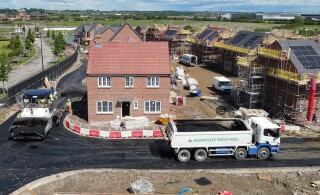Tarmac and Aggregate Industries have both, on the same day, declared that they are switching from hot to warm mix as their standard asphalt recipe.
Both cite sustainability as the reason for moving from hot mix asphalt (HMA) to warm mix asphalt (WMA).
Mixing at temperatures 20° to 40°C lower than hot mix asphalt (HMA) allows for a significant reduction in CO2 emissions by using less fossil fuels and resources during the manufacturing process. It also reduces fumes, making for safer working conditions at both the plant and site.
WMA also reaches trafficking temperatures quicker than conventional hot asphalt, enabling earlier reopening of carriageways. This will increase a contractor’s productivity by enabling more material to be laid within a working window, reducing the overall construction timeframe and subsequent delays to motorists.
From 1st July, 40 of Tarmac’s asphalt plants across the UK will default to warm mix for all lower layer materials as the company phases out traditional hot mix asphalt for highways projects. It expects the switch to save 13,500 tonnes of carbon dioxide a year.
Tarmac said that it was the most significant sustainable improvement to its range of asphalt mixtures in the company’s history. Tarmac’s original founder Edgar Hooley first patented traditional hot mix asphalt in 1902.

Brian Kent, technical director at Tarmac, said: “While warm mix technology has been widely available to our customers over the past five years, against the backdrop of the climate emergency, we are now proactively switching our plants to offer this low carbon material as our standard and preferred option.
“This is a significant sustainability-focused improvement on Edgar Hooley’s original process, but it embraces the innovative spirit of our founder which remains at the heart of our business along with our clear commitment to help the UK transition to net zero.”
Vicky Smith, managing director of asphalt at Aggregate Industries, said: “Our position as the UK’s leading building materials supplier means our contribution towards the transition to net zero must be intrinsic. We recently made the switch from hot mix to warm mix asphalt across our range of asphalt products, which our customers have been piloting for a number of months.”
She added: “Moving to WMAs is a huge step forward on our sustainability journey. If all production in the UK switched to WMAs, it would save around 61,000 tonnes of CO2 a year.”
Surfacing contractor Premier Road Surfacing has already switched to Aggregate Industries’ warm mix asphalt. Director Matt Pursglove said: “Warm mix asphalt is a great product that has many benefits over the standard asphalt mixes. The benefit of using warm mix is that you can multi-layer within the same day if the site conditions allow, thus reducing the time required on site and lowering our carbon footprint. All our road planing produced goes back to Aggregate Industries’ mixing plants or quarries to be recycled back into the warm mix base and binder courses laid on our projects.”
Got a story? Email news@theconstructionindex.co.uk



